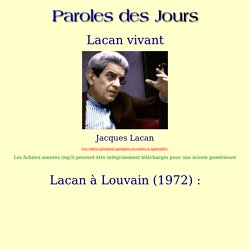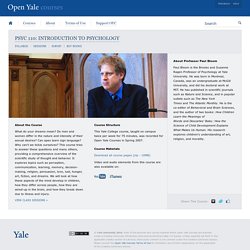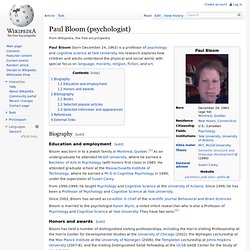

École Lacanienne de Psychanalyse - Accueil. Pour librement associer psychanalyse et grand public. Paroles des Jours. Lacan vivant Jacques Lacan Les vidéos prennent quelques secondes à apparaître.

Les fichiers sonores (mp3) peuvent être intégralement téléchargés pour une écoute postérieure. IHEP.fr. Harcelement moral. INSTITUTIONS LIEES A AUX TROUBLES DE LA SANTE MENTALE. Théorie des intelligences multiples. Un article de Wikipédia, l'encyclopédie libre.

La théorie des intelligences multiples suggère qu'il existe plusieurs types d'intelligence chez l'enfant d'âge scolaire et aussi, par extension, chez l'Homme. Cette théorie fut pour la première fois proposée par Howard Gardner en 1983. L'origine de la théorie[modifier | modifier le code] Winnicott - Conceitos. Inconsciente Coletivo. Análise de uma mente - Freud (Dublado com legenda) Por que sonhamos? (documentário BBC parte1)
Documentário em homenagem a obra de Carl Gustav Jung - "Do mais profundo da Alma" - spanõl. Face to Face - Entrevista com Carl Jung legendada em Português. Euniverso Junguiano: Jung - Vida e obra. Carl Gustav Jung - Questão do Coração. Saiba o que é arquétipo e o significado dos símbolos dos sonhos. C.G. Jung - A Importância dos Sonhos (Parte I de II) Communication interpersonnelle.
Laborit. Introduction to Psychology. Syllabus Professor Paul Bloom, Brooks and Suzanne Ragen Professor of Psychology Description What do your dreams mean?

Do men and women differ in the nature and intensity of their sexual desires? Texts Gray, Peter. Requirements Exams: There is a mid-term and a final. Reading Responses: Starting on the third week of class, you will submit a short reading response every week. Book Review: You will write one book review. Experimental participation: All Introductory Psychology students serve as subjects in experiments. Grading Reading responses: 15%Book review: 20%Midterm examination: 30%Final examination: 35% Join a Study Group Through a pilot arrangement with Open Yale Courses, OpenStudy offers tools to participate in online study groups for a selection of Open Yale Courses, including PSYC 110. View study group OpenStudy is not affiliated with Yale University. Introduction to Psychology Course, Yale Psychology Video Tutorials, Paul Bloom. SEE: Guide to Download Yale Video Lecture Lecture Details : Professor Paul Bloom welcomes students and presents the course as a comprehensive introduction to the study of the human mind.

Course readings and requirements are discussed. The five main branches of psychology are presented: neuroscience, which is a study of the mind by looking at the brain; developmental, which focuses on how people grow and learn; cognitive, which refers to the computational approach to studying the mind; social, which studies how people interact; and clinical, which examines mental health and mental illnesses. Course Description : What do your dreams mean? Other Resources : Citation | These Free Lectures are licensed under a Creative Commons License by Yale University Other Psychology Courses » check out the complete list of Psychology lectures I am 60 years old with a high school education and a life of experiences. I wish you could have secured permission to show the overhead images and videos. Paul Bloom (psychologist) Paul Bloom (born December 24, 1963) is a professor of psychology and cognitive science at Yale University.

His research explores how children and adults understand the physical and social world, with special focus on language, morality, religion, fiction, and art. Bloom was born in to a Jewish family in Montreal, Quebec.[1] As an undergraduate he attended McGill University, where he earned a Bachelor of Arts in Psychology (with honors first class) in 1985. He attended graduate school at the Massachusetts Institute of Technology, where he earned a Ph.D in Cognitive Psychology in 1990, under the supervision of Susan Carey. From 1990-1999, he taught Psychology and Cognitive Science at the University of Arizona.
Meditation guidée pour se détacher de ses pensées.
PSY :)